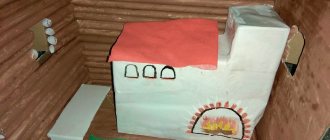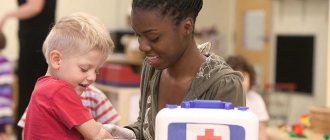Methodical complex “Valeological education of parents”
Technologies for educating parents as a means of promoting a healthy lifestyle in preschool children. Working with parents Preschool age is decisive in forming the foundation of physical and mental health. Until the age of seven, a person goes through a huge developmental path that is not repeated throughout subsequent life. It is during this period that intensive development of organs and the formation of functional systems of the body take place, the main personality traits are laid, character and attitude towards oneself and others are formed. In modern society, the problem of preserving and strengthening the health of children is more relevant than ever before. This is explained by the fact that very high demands are placed on them, which only healthy children can meet. And we can talk about health not only in the absence of any diseases, but also in the condition of harmonious neuropsychic development, high mental and physical performance. At the same time, the results of scientific research indicate that already in preschool age there are fewer and fewer healthy children. The percentage of physiological immaturity is high (more than 60%), which causes an increase in functional (up to 70%) and chronic (up to 50%) diseases. More than 20% of children are underweight. The leading functional deviations are disorders of the musculoskeletal system, cardiovascular system, and digestive organs; Among chronic pathologies are diseases of the nervous, respiratory, musculoskeletal, genitourinary systems, as well as allergic diseases. Most preschool children have various disorders in psychophysical development. The reasons for the sharp decline in the level of health of preschool children are: a drop in living standards; social upheaval; unfavorable environmental situation in Russia; deterioration in maternal health; stress; deficit of motor activity; insufficient qualifications of teachers in matters of health protection and physical activity; mass illiteracy of parents in matters of maintaining the health of children; partial destruction of medical control services; malnutrition. The health of children depends not only on the characteristics of their physical condition, but also on the living conditions in the family, the sanitary and hygienic culture of people, the level of development of healthcare and education, the socio-economic and environmental situation in the country. At this time, due to the catastrophic deterioration in the health of the population and children, the problem of interaction between preschool educational institutions and families in raising a healthy younger generation is especially acute. In a preschool educational institution, the task of preserving and strengthening the health of children has always been a priority. All kinds of hardening procedures were introduced. Only what is brought up in the family can truly take root in a child. The basis for success in upbringing is the positive example of an authoritative adult for the child - a parent, educator. Parents, in the presence of a child, must control their every step and carry within themselves the ideals that they would like to instill in him. The need for valeological education is also emphasized by studies confirming that human health depends only 7-8% on the success of healthcare and more than 60% on one’s lifestyle. Currently, preschool institutions face many problems that have a negative impact on resolving issues of preserving and strengthening the health of children when interacting with the family: imperfection of the regulatory framework: lack of state standards for preschool education; imperfection of the activities of the medical, psychological and pedagogical service of the preschool institution in matters of relationship with the family, taking into account their social status; lack of a system in treatment and preventive work, lack of corrective measures for children with health problems; lack of a system in matters of family education in pedagogical, psychological and valeological areas; The health-saving activities of the preschool institution have not been sufficiently thought out (the predominance of the aspect on the intellectual development of children, strict regulation of the daily routine and the absence of one in the family; overload of groups); imperfection of physical culture and health work - lack of a system; inconsistency of the level of professional competence of teaching staff with modern requirements for the quality of the educational process (lack of development of skills in using health-saving technologies in practice; authoritarian, official communication with children, inertia of thinking; attitude of educators towards parents as objects of education; incomplete awareness of educators about the living conditions of the child at home and, accordingly, parents about the child’s life in kindergarten; the desire of educators to avoid “live” communication, to replace it with questionnaires, information stands); the level of pedagogical competence of parents does not allow them to take an active position in the educational process of preschool educational institutions, the lack of development of the needs and skills of children, parents and teachers for a healthy lifestyle; lack of proper material and technical base that meets the health-preserving orientation of the educational process; low social status of the teaching profession in society. Joint work with the family should be based on the following basic principles that determine its content, organization and methodology. Unity, which is achieved if the goals and objectives of raising a healthy child are well understood not only by educators, but also by parents, when the family is familiar with the basic content, methods and techniques of physical education and health work in kindergarten, and teachers use the best experience of family education . Systematic and consistent work (in accordance with a specific plan) throughout the year and the entire period of the child’s stay in the preschool institution. Individual approach to each child and each family based on their interests and abilities. Mutual trust and mutual assistance between teachers and parents based on benevolent criticism and self-criticism. Strengthening the authority of the teacher in the family, and of parents in kindergarten. It is the kindergarten that is the place for pedagogical education of parents. The forms of interaction with parents are varied; they can be both individual and group, traditional and non-traditional. In accordance with this, educating parents on healthy lifestyle includes: familiarizing parents with the results of diagnosing the child’s health status and psychomotor development; participation in the preparation of individual programs (plans) for children’s health; targeted sanitary education work promoting general hygienic requirements, the need for a rational regimen and a complete balanced diet, hardening, optimal air and temperature conditions, etc.; familiarizing parents with the content of physical education and health work in kindergarten, aimed at the physical, mental and social development of the child; training in specific techniques and methods of healing (physical therapy, breathing exercises, self-massage, various types of hardening, etc.); familiarization with treatment and preventive measures carried out in preschool educational institutions, training in certain non-traditional methods of improving the health of the child’s body (herbal medicine, aromatherapy, etc.). To implement these tasks, the following are widely used: information in parent corners, in mobile folders, in the preschool library; consultations; oral journals and discussions with the participation of psychologists, doctors, physical education specialists, as well as parents with experience in family education; seminars and workshops; business games and trainings with listening to tape recordings of conversations with children, analysis of problem situations based on video recordings, solving pedagogical crossword puzzles, etc.; “Open days” for parents with viewing and conducting a variety of classes in the gym, at the stadium and in the pool, hardening and therapeutic procedures; joint physical education leisure and holidays, etc. The basis of education on healthy lifestyle is an individual health program (plan), developed for each child at the beginning of the school year together with parents on the basis of an in-depth diagnosis of the state of his health and psychomotor development, which includes: anamnesis of morbidity for previous time period; examination of the child by specialized specialists and a general examination (pediatrician’s conclusion); functional diagnostics; analysis of children's skills by main types of movements; Questioning parents on raising a healthy child. A special form of visual promotion of children's health among parents is valeological newspapers, booklets, and memos. The material for them is selected by educators, compiled and included in the plan for valeology work with parents. They reflect the most pressing problems of a healthy lifestyle for children. Visual aids help parents better understand the conditions, tasks and methods of raising healthy children. Recommendations from specialists on the problem of children’s health that interests parents, as well as articles for parents taken from other newspapers and magazines can also be selected. The topics of newspapers can be varied: “Daytime sleep: is it necessary and when to give it up”, “Breathing exercises and child health”, “Secrets of healthy food”, etc. Increasing the psychological and pedagogical competence of parents, involving them in active participation in educational process is an integral part of valeological education for introducing a healthy lifestyle. Thus, educating parents allows not only to actually implement an individual approach to each child, but also to involve parents in joint systematic efforts to improve the health of the child’s body throughout their stay in a preschool institution. References: ABC of health: digest / Comp. L. G. Dukhanina; Region det. - young man b-ka. - Tomsk, 2006. - 32 p. Lukina L.I. The path to a child’s health lies through the family. // Management of preschool educational institution. — No. 7. — 2006. National Doctrine of Education (approved by Decree of the Government of the Russian Federation of 04.10.00 No. 751) Runova M. Help your child improve his health! // Magazine "Preschool education". — No. 9. — 2004. Smirnov N.K. Health-saving educational technologies and health psychology. . M.: ARKTI, 2005. Tretyakov P.I., Belaya K.Yu. Preschool educational institution: management by results. M. New School, 2003. Prepared by: physical education instructor (swimming) Dinner L.A.
Questionnaire for parents on physical education and health work 1. What do you think is the state of your health? a) very good b) good c) normal d) bad 2. How often do you drink alcohol? a) I don’t use b) very rarely c) I often use 3. Do you try to maintain a daily routine at home? a) yes b) not always c) no 4. Do you and your child do exercises? a) yes, always, with the children b) irregularly, with the children c) irregularly d) no 5. Do you go for walks with your child after kindergarten and on weekends? a) yes, definitely b) sometimes c) not possible d) I think there is no need 6. Do you play outdoor games with your child? a) yes, definitely b) sometimes c) not possible d) I think there is no need 7. What difficulties do you experience in the physical education of children? 8. “Healthy lifestyle” – how do you understand this? • Proper nutrition • Maintaining a daily routine • Favorable environmental conditions • Harmonious relationships in the family • Physical education • Other_ _ _ 9. What types of activities does your child have at home? • Drawing, modeling, design classes • Outdoor games • Hiking with parents • Listening to stories, fairy tales • Watching children's television programs • Physical exercise • Other_ _ _ 10. How do you improve your child’s health? • Visiting doctors • Physical exercise • Hardening • Breathing exercises • Massage • Walking in the fresh air • Proper nutrition • Other_ _ _ 11. What is your age? _ _ _ 12. Age of the child_ _ _ 13. Your wishes_ _ _ Thank you for your cooperation! Prepared by: physical education instructor (swimming) Dinner L.A.
Consultation for parents Topic: Delicious cold recipes for children Very often, when children get sick, this dramatically affects their appetite. I don't want anything. And in these difficult days, I really want to sweeten the “pill” for the baby. We, parents, often follow the lead of little whims and indulge them with chocolates and cakes. Meanwhile, this is not the best food for a weakened child’s body. It is better to pamper your children with delicious and healthy folk recipes for colds. It’s both sweet and will cope well with illness. “Orange” salad » Grate fresh carrots, mix them with honey in a ratio of 2: 1. In addition to the general vitaminizing and anti-inflammatory effect, this salad will significantly ease sore throat with sore throat and remove white plaque from the tonsils. You can add some nuts and dried fruits to make the salad more filling. Apple “Surprise” Treat your child to a baked apple. It's not at all difficult to prepare, especially if you have a microwave oven. It is enough just to cut out the core (not all the way through) and fill the hole with honey, pureed berry “jelly” (for example, from cranberries) or sweet curd with raisins. This simple dessert will greatly help your child’s immune system. Apples contain a lot of vitamins, iron and phytoncides. Moreover, baked apples are considered healthier than fresh ones, and they are absorbed by the body much better. Cranberry disinfects and has a good diuretic effect, honey has an anti-inflammatory effect, and cottage cheese energizes and nourishes the body. “Fig milk” Boil the figs over low heat for 20 minutes (after boiling) at the rate of 3-4 pieces per glass of milk. This is a very useful and effective remedy for cough. Since ancient times, figs have been known for their beneficial properties; they are even used as part of anticancer drugs, so it will not be difficult for them to cope with a common cold. “Parenki” with raisins. Place several small turnips in a clay pot, pour in ½ cup of water and put in the oven to simmer under the lid. When the turnips soften, add 100-150 grams. raisins and steam for another 5 minutes. When it cools down well, give it to the baby. You can “season” it with a spoon of honey. Rosehip tea Pour 1 tbsp. l. dry fruits with a glass of water, add 1-2 tsp. sugar and cook covered for 10 minutes. Then leave for 1-2 hours (covered), strain and drink throughout the day instead of water or tea. Rosehip is a well-known natural immune tonic. And the delicious tea, with a pleasant sourness, contains a full dose of vitamin C, which is so necessary during the period of resistance to infection. “Magic milk” Prepare a honey drink from water with honey. Mix black radish juice (can be replaced with carrot juice) and milk at the rate of 1: 0.5: 0.5. Let your baby drink 1 tablespoon 6 times a day. This is another delicious recipe for colds. It is also an effective cough remedy. And of course, do not deny your child his favorite fruits: grapes, oranges, pears, melon, bananas. Give it freshly squeezed juices, just don’t overdo it in the matter of fortification. Remember that too many vitamins are not very beneficial either. Everything is good in moderation, especially in such a delicate matter as the health of your baby. We hope these delicious cold recipes will help your children cope with the disease. Get well soon! Prepared by: physical education instructor (swimming) Dinner L.A.



